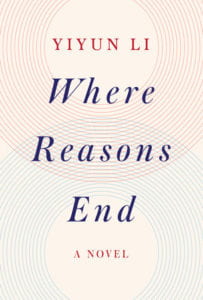Yiyun Li Grapples with Loss in “Where Reasons End”

By Freddy Caione
Yiyun Li, in her most recent novel, “Where Reasons End,” delves into the pain of losing her 16-year-old son to suicide. Narrated by a mother whose son has recently taken his own life, this heartfelt book becomes the only remaining medium through which Li can converse with her child. Li writes, “We once gave Nikolai a life of flesh and blood; and I’m doing It over again, this time by words.” She creates a moment outside of the liminal journey of life towards death in order to convey a world outside of time – “a world made up by words, and words only. No images, no sounds.”
The novel follows no real plot, and yet tracks a grief that has a sort of progression. Language acts as the main focus of this text: words’ roots, meanings, uses, and misuses. The narrator’s son, Nikolai (a fictional stand-in for the author’s late son), is quick to criticize his mother for her word choices: “Unfettered, he said. You chose the wrong word.” Her son’s voice expresses the narrator’s anxiety about her use of language as he chides her for overusing clichés and neglecting the importance of diction in her writing and everyday life. Li writes, “Fuddled, muddled, befuddled, I said. Every time you say something I have to turn to the dictionary.” Nikolai responds that nobody needs to know every definition, to which his mother brilliantly responds, “many people don’t have to go to this extreme as I do so as not to lose someone.”
Li does not simply savor the past, but looks towards a future. She finds a new role for herself as a mother. She writes, “Even so I had dreaded the first holiday without Nikolai. He used to bake around the holidays. This time, I decided, we must bake a pie ourselves.” Li commandeers the voice of her son and assumes his actions in her daily life as a way to celebrate him and cope with her loss.
While much of this novel concerns Li’s reconnection with her son through playful conversations about diction and past memories, Li does not avoid the more painful aspects of motherhood and loss. The narrator says to Nikolai, “I truly wish we had been friends. I love you so much but I can only love you as your mother. Sometimes a mother becomes the worst enemy because she can’t be the best friend.” Moments like this, when the technicality of language is put aside in order to inquire into the genre of the confessional, further illuminate the raw feelings of grief and hope that are entangled within this text.
“Where Reasons End” speaks to the way in which Li not only clings to the memory of her son through language, but also works through her grief in a process of learning. She is learning the language of mourning, and the reader learns it alongside her.
Freddy Caione is a senior at NYU studying English. He enjoys experimenting with poetry and fiction as he tries to find his place in the literary world. You can find him listening to “This Must Be the Place” by The Talking Heads on repeat and using the em dash religiously.

